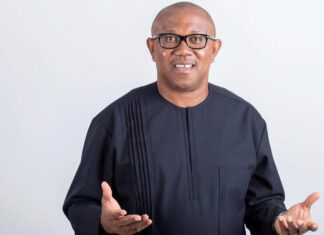- News
- No Comment
Obi Pledges Equal Representation Of The Rich And The Poor

…. Set To Wipe Out Gender Inhibitions
The Presidential Candidate of the Labour Party, Mr Peter Obi, has assured Nigerians that if he is elected President in 2023, his government will recreate a nation where the rich and the poor are equitably and fairly represented.
He also said he will ensure Nigeria becomes a place where citizens’ interests will supersede political interests.
A press release from Obi-Datti Media Office, made available to NewsOrient, quoted Obi as saying his administration will also reduce to the barest minimum the existing trust gap between the government and the governed.
Obi’s view came in the remarks he made at the weekend to the Queen’s College Lagos Old Girls Association who were marking the 95th anniversary of their alma mater.
The LP standard bearer said female representations in his government will be assured, recalling that as governor of Anambra State, his administration achieved close to a 60-40 gender balance in appointive and elective positions while that of federal government hovered around 30 to 35% , but he assured the women that his Presidency if elected “intend to progressively aim for between 35-40%, with aggressive gender mainstreaming action plan and rigid benchmarks”
He announced that education is central to his government policy thrust and said he will pursue a Marshal plan-type programme on education that incorporates compulsory technical and vocational skills, sports, entrepreneurship, programming, and digital skills from primary to the secondary level.
And ‘inevitably, we will improve access to finance, MSMEs, youths and women, to significantly reduce unemployment and insecurity.
According to the former Anambra State Governor, “We will introduce a mandatory “No Child left Behind” educational policy, mindful that Nigeria’s inadequate investment in the social sectors – health, education, and housing has resulted in the current dismal social and demographic trends reflected in low life expectancy, high maternal mortality rate, large number of out-of- school children, huge unmet housing needs as well as high youth unemployment.
“Our government shall prioritize education to serve the following functions: technical and industry relevance; alignment with local comparative advantages and factor endowments; modern skills proficiency, critical thinking, ethical citizenship values, global competitiveness, and talent export.
Obi’s plans will also be to “prioritize a structured approach to developing the digital skills of our young population to give them the competitive advantage to receive offshore jobs in the new gig economy, while also improving the efficiency and productivity level of our economy.”
“The Obi-Datti team, when elected President of Nigeria, will sustain national development. Our governance principles, priority projects and programmes shall be anchored on the 17 Sustainable Development Goals (SDGs).
Obi noted that experience shows that inclusiveness is an essential element in effective public policy making, pointing out that he intends to stop the under representation of critical components of the society in decision making such as women, youth, and the vulnerable in our midst.
The candidate told the Queens College Old Girls that if elected President, he will “from its inception, encourage investment in infrastructure, energy, transport, irrigation, and telecoms and education with gender mainstreaming and social inclusion in education, enterprise and politics will always be a priority.
Obi also expressed his commitment to the well being of the girl child and women, pointing out that this will be fully reflected in his broad and gender-specific policies.
He also plans to reset and reboot Nigeria in all ramifications –leadership and governance, security of life and properties, economic and political freedom and this, according to the candidate, “will entail the promotion of intangible assets that underpin democracy; namely, good governance, rule of law, security of lives and properties and robust institutions.
There will be visible and measurable indices of governance the people can experience,” Obi said.
